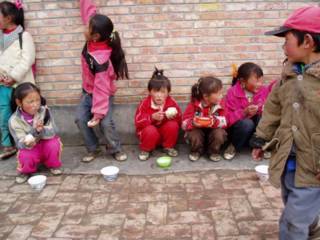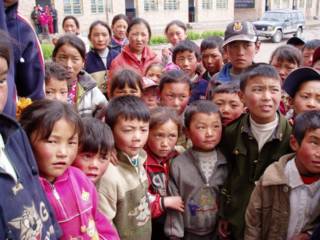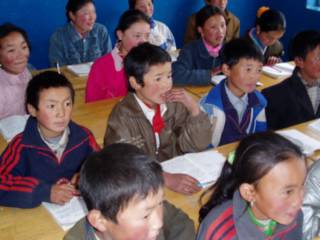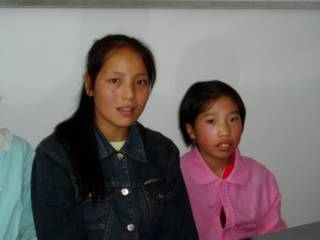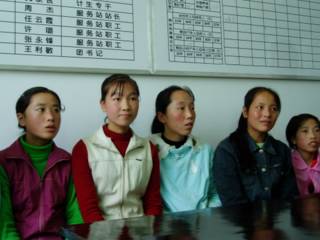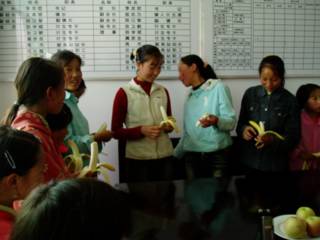Wednesday, December 20, 2006
Zoe Guanlan's Sisters.wmv
| Zoë Guanlan’s Sisters, is the story of an American family’s efforts to help poor young girls in rural China break the cycle of poverty by getting an education. This isn’t just any family, Vilma, Tom and Zoë Guanlan are a “global family.” Dr. Vilma Seeberg is German by birth, a naturalized citizen who works as a professor of education at Kent State University, has lived and worked in China, is fluent in Chinese and has written two groundbreaking books about literacy and education in China. Dr. Seeberg’s husband, Tom Jacobs, is African-American and an EMMY award-winning, veteran television producer. Their adopted daughter, Zoë Guanlan, born in Suzhou, China, in 1998 is an energetic, happy nine year old. In 2000, Vilma and her family were in China for an international conference. She heard about the difficulties girls in rural villages were having in getting the education they longed for. Determined to help, she returned to the states and established a scholarship fund named for her daughter. With the assistance of colleagues at Shaanxi Normal University, for the past 6 years, the Guanlan Scholarship has been paying school fees for 20 girls in the village of Zhang Cai, Shangzhou County, in rural northwest China. In the fall of 2004, Vilma undertook a research trip to rural northwest China. This video is a look at some of what she and the family saw. She and her family visited 16 schools and explored the challenges facing girls who wanted an education. The highlight of the trip for the family came in Shangzhou County where they met the Guanlan scholarship girls. Zoë Guanlan’s Sisters chronicles their journey. | |
Sunday, October 31, 2004
The China Project: The Children
The best part of the China Project was meeting the children. Despite the fact that many of them lived in conditions that we would consider horrific, they all exhibited the wonderful innocence that makes children so special.
We've posted a few pictures of the children at the Guashize Primary School, Qinghai Province. This was one of the poorest schools we visited but also one of the most inspiring. The faces of the children speak volumes.
The second set of photos are of "our" girls. These are some of the girls who have benefited from the Guanlan Scholarship Fund. They were remarkable and wonderful. We took them all into our hearts and look forward to our next visit with Guanlan's "sisters."
We have over 2500 digital photos to review. From time to time we'll post others. Enjoy!
Tom
The best part of the China Project was meeting the children. Despite the fact that many of them lived in conditions that we would consider horrific, they all exhibited the wonderful innocence that makes children so special.
We've posted a few pictures of the children at the Guashize Primary School, Qinghai Province. This was one of the poorest schools we visited but also one of the most inspiring. The faces of the children speak volumes.
The second set of photos are of "our" girls. These are some of the girls who have benefited from the Guanlan Scholarship Fund. They were remarkable and wonderful. We took them all into our hearts and look forward to our next visit with Guanlan's "sisters."
We have over 2500 digital photos to review. From time to time we'll post others. Enjoy!
Tom
Monday, October 25, 2004
The China Project
(Editors Note: The China Project: Getting to them Early is an ambitious research and documentary project that looks at the status and quality of education for young girls in rural China. It was developed by my wife, Dr. Vilma Seeberg, a professor in the College of Education at Kent State University. Between Aug.24 and Oct.5, 2004, our family, including Zoe Guanlan, our Chinese born 7-year-old-daughter, traveled more than 30,000 miles, visited three provinces, dozens of towns and villages and most important 14 schools in rural Northwest China. These excerpts from my daily log detail some of my observations.)
Suzhou is a very special place for us. It’s the city in which are our daughter Zoe Guanlan was born, it's the city we first saw her and it's the city where a very special family lives. We wanted to share our experiences with the Li family and we think after reading this you’ll see why.
(Note: You'll see an ad for Amazon.com on this site. All proceeds derived from Amazon.com in connection with worldvillage will be donated to the Guanlan Scholarship Fund)
***************************************
The China Project:Getting to them Early
Daily Log-Day 10-Suzhou
Sept. 2, 2004
We were very lucky when we adopted little Guanlan Su (her Chinese name). Not just because we received the gift of a wonderful little girl, but because we also got to know the Li family. Zoe Guanlan as we call her now, was only in the orphanage for eight months, because the Li's brought her into their home and cared for her the next seven months before she came to us.
Since China doesn't have much of a foster care system, the journey Zoe Guanlan took to the Li's is even all the more remarkable. The Li's had three children, two girls and a boy. Tragically, their son had died and friends had suggested as a way of dealing with their grief they take in one of the children at the nearby orphanage. They had already taken in one little girl who had been adopted by another American couple and had returned to the orphanage to pick up another little girl. The little girl they were supposed to take was Zoe Guanlan's cribmate. But when they got there, Zoe being Zoe even then, put up such a fuss, they picked her up. When they tried to put her down, she would start again. So they asked if they could take this little girl instead, perhaps sensing that this was a child that needed them. When they got her home she wouldn't eat. They took her to the hospital where she was diagnosed with "failure to thrive" syndrome, a common and often fatal problem for children in orphanages. They began to treat her and she responded, growing stronger everyday. The doctors said if the Li's had not brought her in she probably would not have lasted another week. You can readily understand why the Li's are very special people to us.
When we got Zoe Guanlan, the Li's had enclosed a letter and pictures they had taken during the time she was with them. It was a wonderful gift for us to know that Zoe Guanlan had been so loved. Thus began a wonderful relationship for Zoe Guanlan and for us. We stayed in touch with the Li's, and though we had never actually met them, we considered them part of our extended family. They wrote about the three other little girls they took in after Zoe Guanlan and we developed enormous respect and love for them. They were Zoe Guanlan's foster grandparents and their two daughters, Zoe Guanlan's big sisters. Zoe would always have real people to connect her to her Chinese heritage.
When we returned to China in 2000 we made a point to schedule a side trip to Suzhou so that we could finally meet these wonderful people. It was a great experience, one that we looked forward to repeating again during this visit. We were not disappointed.
Mr. and Mrs. Li, both daughters, with their two children, all met us to take us on a day trip to a lake outside of Suzhou. It was a terrific day, great weather and Mr. Li was just beaming. But besides the joy of spending the day with them, it was also interesting because of what we saw.
Suzhou is often called the "Venice of China," because of all the canals winding their way through the city. But in recent years, Suzhou has also emerged as one of the key players in China's economic growth. Back in 1994, Suzhou signed an economic development agreement in partnership with Singapore to create the Suzhou Industrial Park. We had occasion to drive through the "Park" on the way into Suzhou. Stretching out for mile after mile, are new roads, freshly landscaped, and building after building housing new and expanding businesses. The scale of the project is astounding and the revenue being generated is reportedly in the billions. Suzhou is spreading north as Shanghai is spreading south and in the not two distant future, the economic clout of these two cities will be enormous.
With this economic boom has come good times for many and the signs are apparent as you drive through the city and out into the countryside. It's boomtime for many. Many but not all.
It became very clear to us as we drove toward the lake, that "New China" and "Old China" are on a collision course. Luxury developments, hotels and resorts are springing up everywhere. But what you often see right next to them are peasants working in the fields, selling fruits and vegetables just outside the gated and highly secured developments. The distance between the "haves" and the "have nots" is growing at a breakneck pace. Mr. Li told us that the government is buying up property at bargain basement rates, razing them and then selling them back to developers for 4 times what they paid the original owners. He said that within five years, he expects that he'll lose his home as this development juggernaut rolls through many parts of China. He said that with the money has come increased corruption among officials already well known for being for sale to the highest bidder.
As we stopped for lunch at one of many restaurants along the shore, he pointed to some islands in the middle of the lake. He told us when SARS hit China 18 months ago, the Chinese leadership, which had tried to hide the epidemic from the public, fled Beijing and took up residence in a luxury villa on one of the islands. So much for solidarity and concern for the people you govern! It's one of those stories that the locals know about, but one that somehow never made it into international reports.
Mr. Li then arranged for us to take a boat ride to the island. It's a well known historic spot and the people who live there, eke out a living by selling refreshments or trying to hustle the tourists for a guided tour. But while it's still pretty rustic, new concrete paths have been poured and new lights installed, all by developers of the lakeside resorts just a short boat ride away. It's pretty clear that in the not too distant future, the people who live here will probably be forced out of their homes and left with the prospect of working for the developers who will own the boats that go to the island, the refreshment stands and the carts to transport the tourists. Mr. Li agreed with this assessment and expressed his contempt for the politicians and officials who he claims are all corrupt.
As we drove back to the city and I saw development after development, I contrasted that with the poverty that still existed, often right at their heavily fortified gates. I wonder, if after surviving Mao Tse Tung's "Great Leap Forward" and the nightmare of the "Cultural Revolution," is China's new economic drive and success destined to create still another revolution. History has shown us time after time that when the distance between the "haves" and the "have nots" become too great, social upheaval inevitably follows. I hope that's not the case for Zoe Guanlan's birthplace, but the journalist and historian in me thinks the clock is ticking…………
**************************************************
Next time…….tourism in China…..it’s big business……..and that means commercialism…….Stay tuned!!!
(Editors Note: The China Project: Getting to them Early is an ambitious research and documentary project that looks at the status and quality of education for young girls in rural China. It was developed by my wife, Dr. Vilma Seeberg, a professor in the College of Education at Kent State University. Between Aug.24 and Oct.5, 2004, our family, including Zoe Guanlan, our Chinese born 7-year-old-daughter, traveled more than 30,000 miles, visited three provinces, dozens of towns and villages and most important 14 schools in rural Northwest China. These excerpts from my daily log detail some of my observations.)
Suzhou is a very special place for us. It’s the city in which are our daughter Zoe Guanlan was born, it's the city we first saw her and it's the city where a very special family lives. We wanted to share our experiences with the Li family and we think after reading this you’ll see why.
(Note: You'll see an ad for Amazon.com on this site. All proceeds derived from Amazon.com in connection with worldvillage will be donated to the Guanlan Scholarship Fund)
***************************************
The China Project:Getting to them Early
Daily Log-Day 10-Suzhou
Sept. 2, 2004
We were very lucky when we adopted little Guanlan Su (her Chinese name). Not just because we received the gift of a wonderful little girl, but because we also got to know the Li family. Zoe Guanlan as we call her now, was only in the orphanage for eight months, because the Li's brought her into their home and cared for her the next seven months before she came to us.
Since China doesn't have much of a foster care system, the journey Zoe Guanlan took to the Li's is even all the more remarkable. The Li's had three children, two girls and a boy. Tragically, their son had died and friends had suggested as a way of dealing with their grief they take in one of the children at the nearby orphanage. They had already taken in one little girl who had been adopted by another American couple and had returned to the orphanage to pick up another little girl. The little girl they were supposed to take was Zoe Guanlan's cribmate. But when they got there, Zoe being Zoe even then, put up such a fuss, they picked her up. When they tried to put her down, she would start again. So they asked if they could take this little girl instead, perhaps sensing that this was a child that needed them. When they got her home she wouldn't eat. They took her to the hospital where she was diagnosed with "failure to thrive" syndrome, a common and often fatal problem for children in orphanages. They began to treat her and she responded, growing stronger everyday. The doctors said if the Li's had not brought her in she probably would not have lasted another week. You can readily understand why the Li's are very special people to us.
When we got Zoe Guanlan, the Li's had enclosed a letter and pictures they had taken during the time she was with them. It was a wonderful gift for us to know that Zoe Guanlan had been so loved. Thus began a wonderful relationship for Zoe Guanlan and for us. We stayed in touch with the Li's, and though we had never actually met them, we considered them part of our extended family. They wrote about the three other little girls they took in after Zoe Guanlan and we developed enormous respect and love for them. They were Zoe Guanlan's foster grandparents and their two daughters, Zoe Guanlan's big sisters. Zoe would always have real people to connect her to her Chinese heritage.
When we returned to China in 2000 we made a point to schedule a side trip to Suzhou so that we could finally meet these wonderful people. It was a great experience, one that we looked forward to repeating again during this visit. We were not disappointed.
Mr. and Mrs. Li, both daughters, with their two children, all met us to take us on a day trip to a lake outside of Suzhou. It was a terrific day, great weather and Mr. Li was just beaming. But besides the joy of spending the day with them, it was also interesting because of what we saw.
Suzhou is often called the "Venice of China," because of all the canals winding their way through the city. But in recent years, Suzhou has also emerged as one of the key players in China's economic growth. Back in 1994, Suzhou signed an economic development agreement in partnership with Singapore to create the Suzhou Industrial Park. We had occasion to drive through the "Park" on the way into Suzhou. Stretching out for mile after mile, are new roads, freshly landscaped, and building after building housing new and expanding businesses. The scale of the project is astounding and the revenue being generated is reportedly in the billions. Suzhou is spreading north as Shanghai is spreading south and in the not two distant future, the economic clout of these two cities will be enormous.
With this economic boom has come good times for many and the signs are apparent as you drive through the city and out into the countryside. It's boomtime for many. Many but not all.
It became very clear to us as we drove toward the lake, that "New China" and "Old China" are on a collision course. Luxury developments, hotels and resorts are springing up everywhere. But what you often see right next to them are peasants working in the fields, selling fruits and vegetables just outside the gated and highly secured developments. The distance between the "haves" and the "have nots" is growing at a breakneck pace. Mr. Li told us that the government is buying up property at bargain basement rates, razing them and then selling them back to developers for 4 times what they paid the original owners. He said that within five years, he expects that he'll lose his home as this development juggernaut rolls through many parts of China. He said that with the money has come increased corruption among officials already well known for being for sale to the highest bidder.
As we stopped for lunch at one of many restaurants along the shore, he pointed to some islands in the middle of the lake. He told us when SARS hit China 18 months ago, the Chinese leadership, which had tried to hide the epidemic from the public, fled Beijing and took up residence in a luxury villa on one of the islands. So much for solidarity and concern for the people you govern! It's one of those stories that the locals know about, but one that somehow never made it into international reports.
Mr. Li then arranged for us to take a boat ride to the island. It's a well known historic spot and the people who live there, eke out a living by selling refreshments or trying to hustle the tourists for a guided tour. But while it's still pretty rustic, new concrete paths have been poured and new lights installed, all by developers of the lakeside resorts just a short boat ride away. It's pretty clear that in the not too distant future, the people who live here will probably be forced out of their homes and left with the prospect of working for the developers who will own the boats that go to the island, the refreshment stands and the carts to transport the tourists. Mr. Li agreed with this assessment and expressed his contempt for the politicians and officials who he claims are all corrupt.
As we drove back to the city and I saw development after development, I contrasted that with the poverty that still existed, often right at their heavily fortified gates. I wonder, if after surviving Mao Tse Tung's "Great Leap Forward" and the nightmare of the "Cultural Revolution," is China's new economic drive and success destined to create still another revolution. History has shown us time after time that when the distance between the "haves" and the "have nots" become too great, social upheaval inevitably follows. I hope that's not the case for Zoe Guanlan's birthplace, but the journalist and historian in me thinks the clock is ticking…………
**************************************************
Next time…….tourism in China…..it’s big business……..and that means commercialism…….Stay tuned!!!



